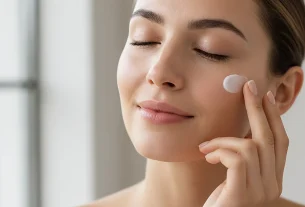Estimated Reading Time: 8 minutes
LLt’s be honest, how many of us truly prioritize sleep?
In a world that glorifies the hustle, getting adequate rest often feels like a luxury, not a necessity.
But what if I told you that cultivating healthy habits for better sleep naturally could drastically transform your life?
Not just your energy levels, but also your mood, your productivity, and even your overall health.
I’m here to share some simple, actionable steps you can start implementing today, drawing from my own experience (and a healthy dose of scientific understanding!).
The truth is, many of us are struggling with sleep.
From late-night work emails to the endless scroll on social media, we’re constantly bombarding our brains with stimuli that make it difficult to wind down.
But before you reach for the sleeping pills, consider this: often, the solution lies not in a quick fix, but in a lifestyle shift. The good news?
This shift is entirely within your control.
Think of your evening routine as a carefully orchestrated symphony.
Every note plays a role in preparing your mind and body for the restorative power of sleep.
One of the most crucial healthy habits for better sleep naturally is establishing a consistent bedtime and wake-up time, even on weekends.
I know, it sounds simple, but the consistency helps regulate your body’s natural sleep-wake cycle, or circadian rhythm.
Imagine your body clock as a finely tuned instrument; consistency is the key to keeping it in perfect harmony.
Here’s a peek into my own evening ritual. I begin dimming the lights about an hour before bed.
This subtle signal to my brain that it’s time to produce melatonin, the sleep hormone.
I also avoid screens – phones, tablets, and laptops – for at least an hour before bed.
The blue light emitted from these devices can interfere with melatonin production and throw your sleep cycle off kilter.
Instead, I might read a physical book, listen to calming music, or journal. These activities help me unwind and disconnect from the day’s stresses.

It also helps you create a buffer zone between work and bedtime.
Your bedroom should be your sanctuary, a haven designed for rest.
Think about it: if your bedroom is cluttered, noisy, and overly bright, how can you expect to drift peacefully into slumber?
A few tweaks can make a world of difference. Aim for a cool, dark, and quiet environment. Block out light with blackout curtains.
Invest in earplugs or a white noise machine to minimize distractions. Ensure your mattress and pillows are comfortable and supportive.
Remember, your sleep environment is a powerful tool.
One particularly impactful change I made was to banish my phone from the bedroom. It was a constant source of temptation and a distraction.
Initially, I felt a sense of loss – that nagging feeling of needing to check something. But after a few nights, the difference was remarkable.
I woke up feeling more refreshed and focused. It was a small change with a big impact on my healthy habits for better sleep naturally.
What you put *into* your body has a profound effect on your sleep *output*. The relationship between diet and sleep is undeniable.
The foods you consume, and the fluids you drink, can significantly impact your ability to fall asleep and stay asleep.
Eating a balanced diet, rich in whole foods, is fundamental. Avoid heavy meals, caffeine, and alcohol close to bedtime.
Caffeine and alcohol are the arch-enemies of good sleep.
Caffeine is a stimulant that can keep you awake, while alcohol might initially make you feel drowsy, but it can disrupt your sleep later in the night, leading to frequent awakenings.
I learned this the hard way. There was a time when I thought a nightcap would help me relax.
Instead, I found myself tossing and turning, and waking up feeling more tired than before.
Staying properly hydrated is crucial for overall health, and it’s just as important for sleep.
Dehydration can lead to muscle cramps and headaches, both of which can disrupt your sleep. Aim to drink enough water throughout the day.
However, be mindful of your fluid intake in the evening to avoid frequent trips to the bathroom during the night.
You might find that reducing liquids a couple of hours before bed is beneficial to one of your *healthy habits for better sleep naturally*.

Consider a warm cup of herbal tea before bed – chamomile, lavender, or valerian root are excellent choices.
These teas have relaxing properties that can help you unwind. I’ve always loved a cup of chamomile tea.
The warm, soothing sensation is incredibly calming, and it helps me transition smoothly from the day’s activities to a peaceful night’s sleep.
Exercise is a cornerstone of good sleep, but timing is key.
Regular physical activity can improve sleep quality, but avoid strenuous workouts close to bedtime. Aim to exercise earlier in the day.
I aim for a morning workout or a brisk walk in the afternoon, which allows my body to wind down naturally in the evening.
Mindfulness practices, such as meditation and deep breathing exercises, can calm your mind and reduce stress, making it easier to fall asleep.
The stress hormone cortisol can wreak havoc on sleep.
Techniques to bring yourself into the present moment, like meditation, is a simple yet powerful solution.
For many, stress and anxiety are the biggest obstacles to sleep.
If you find yourself constantly worrying about the day’s events or the challenges ahead, you might benefit from incorporating mindfulness practices into your routine.
Even a few minutes of meditation or deep breathing can make a difference. There are countless apps and online resources to guide you.
I’ve personally found the “5-4-3-2-1” grounding technique incredibly helpful.
This involves focusing on your senses – what you can see, hear, feel, smell, and taste – to bring yourself back to the present moment.
Another trick that has always worked is journaling. Writing down your thoughts and worries before bed can help clear your mind.
It’s a way of externalizing those concerns so they don’t keep you awake.
Changing your sleep habits takes time and patience. Don’t expect overnight results. Be consistent with your routine, even on weekends.
It might take a few weeks or even months to see significant improvements in your sleep quality.
The important thing is to stay committed to your goals and celebrate your progress along the way.
Don’t get discouraged if you have a bad night’s sleep. It happens to everyone.

Just get back on track the next day and keep building your healthy habits for better sleep naturally.
I remember when I first started this journey. I wasn’t perfect. There were nights when I stayed up too late or didn’t follow my routine.
But I persevered. And slowly, but surely, my sleep improved. Now, I can’t imagine going back to the way things were before.
It was so worth it, and it continues to pay dividends in my overall health and well-being.
Remember to consult with a healthcare professional if you’re experiencing persistent sleep problems.
They can help identify any underlying medical conditions and provide personalized advice.
But for most people, implementing these simple healthy habits for better sleep naturally can make a world of difference.
So, are you ready to reclaim your nights and wake up feeling refreshed and energized?
Start incorporating these simple habits into your life, and you’ll be well on your way to experiencing the benefits of truly restful sleep.
Your body and mind will thank you!
Frequently Asked Questions
What are the most common mistakes people make when trying to improve their sleep?
One common mistake is inconsistency. Our bodies thrive on routine, but the weekend sleep-ins and late nights during the week can throw off your circadian rhythm. Another error is relying on screens too close to bedtime.
The blue light emitted from devices can suppress melatonin production, making it harder to fall asleep. Finally, many people overlook the importance of their sleep environment. A noisy, bright, or uncomfortable bedroom can sabotage even the best intentions for a good night’s rest.
How much sleep do adults really need?
Most adults need between seven to nine hours of sleep per night to function optimally. Individual needs can vary, and factors like age, lifestyle, and overall health play a role. Some people may naturally require slightly more or less sleep.
It’s often more important to focus on the *quality* of your sleep rather than just the quantity. Waking up feeling refreshed and energized is a key indicator of adequate sleep.
Are there any natural remedies to help with sleep that I should be aware of?
Yes, several natural remedies can promote better sleep. One is the use of herbal teas like chamomile or valerian root, which can have calming effects. Another is the use of magnesium supplements, as magnesium helps to relax the muscles.
Furthermore, maintaining a regular sleep schedule, avoiding caffeine and alcohol before bed, and practicing relaxation techniques like meditation are all natural ways to enhance sleep quality. Please consult your doctor before trying any new remedies.
Can exercise really help me sleep better?
Absolutely! Regular physical activity is one of the most beneficial things you can do for your sleep. Exercise helps regulate your circadian rhythm, reducing the time it takes to fall asleep and improving sleep quality. The key is timing.
Aim for exercise earlier in the day or the late afternoon, at least a few hours before bed, as vigorous workouts close to bedtime can sometimes have a stimulating effect. Gentle stretching or yoga before bed can also be very helpful.



